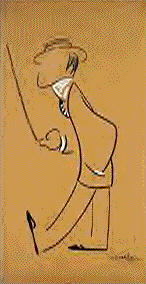George M. Cohan In America's Theater | home
Stageography | What's New | George Washington, Jr. | The Merry Malones | Broadway Jones | 45 Minutes From Broadway | About Me | The Little Millionaire | Little Nellie Kelly | The Tavern | Seven Keys To Baldpate | Ah, Wilderness! | Get Rich Quick Wallingford | The Royal Vagabond | Discography & Filmography | Early years: 1878-1900 | Broadway Rise: 1900-1909 | Broadway Emperor: 1910-1919 | Decline & Fall: 1920-1929 | Little Johnny Jones | I'd Rather Be Right | Broadway Legend: 1930-1978 | Mailbag/Contact Me | Related Links | Articles & Thoughts | The Yankee Prince
Opened September 25, 1911
The Cohan Theater
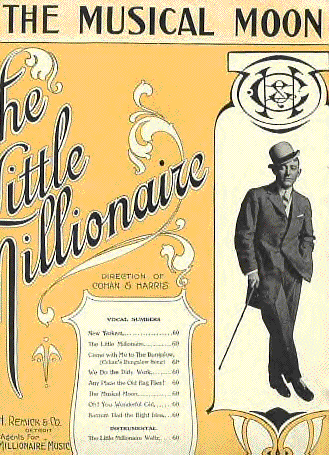
Sheet Music Cover
Original Cast:
Robert Spooner.......................George M. Cohan
Henry Spooner.........................Jerry J. Cohan
Mrs. Prescott............................Helen F. Cohan
Goldie Gray..............................Lila Rhodes
Bill Costigan............................Tom Lewis
Edward/Plumber ....................Donald Crisp
George Russell.......................George Parsons
Roscoe Handover...................Sidney Jarvis
Bertha Burnham......................Josephine Whittell
Danny Wheeler........................Earl Benham
Mary..........................................Amy Mortimer
Synopsis:
Young Robert Spooner (The Little Millionaire) has fallen in love with a chorus
girl named Goldie Gray. His love for her is such that he is willing to risk all his
fortune to marry her (it is stipulated in his mother's will that both he and his
father must approve of each other's wedding partner to keep the family fortune).
Added to this, a champaign magnet named Bill Costigan, refuses to leave
Robert's home without convincing Robert to end his engagement (he knows
all there is to know about marriage, he pays $1,000 per month alimony).
Robert's father, Henry unexpectedly arrives home from his vacation in Europe
with big news: He too intends to get married! This further creates a whirlwind
of confusion because he intends to marry Costigan's ex-wife. With news of the
weddings in the house, Roscoe & the maid, plan to ransack the mansion of all
it's cash and valuables, in protest of the marriages. Costigan's ex-wife and
Goldie Gates' aunt (Mrs. Prescott) are mutual enemies and the reason for
Costigan's divorce. In the end it all gets sorted out as Robert marries Goldie,
Costigan reconciles with his ex-wife, Henry marries Mrs. Prescott, Roscoe
and the maid are apprehended by the police, and both father and son get to
keep their fortunes.
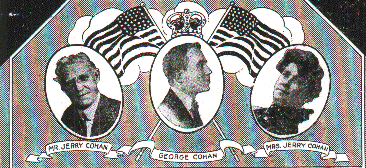
Jerry Cohan George M. Cohan Nellie Cohan
"The Little Millionaire" would be the last musical to
feature more than one Cohan on the stage.
Songs From The Show:
Act I
The New Yorkers
The Little Millionaire*
Come With Me To My Bungalow
We Do The Dirty Work
Charastic Waltz*
Drill Of The 7th
Anyplace The Old Flag Flies*
Act II
No musical performances
Act III
Musical Moon
Oh, You Wonderful Girl
Barnum Had The Right Idea*
The Dancing Wedding*
* indicates songs performed by Cohan
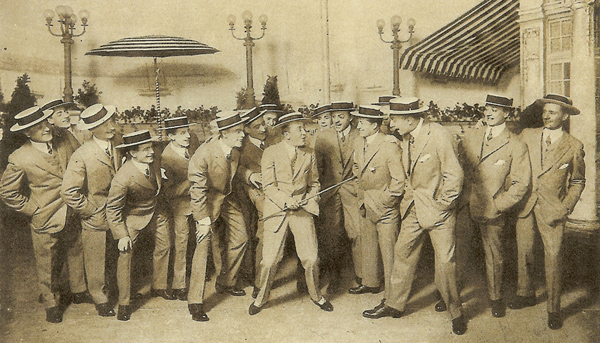
George M. performing "Anyplace The Old Flag Flies" at the close of Act I
Critic's Corner:
"Again George M. Cohan has dared and won. An inveterate perpetrator of dramatic
tricks and surprises, in "The Little Millionaire" he has so far disdained the traditions
of musical comedy as to present an entire act without a note of music or without a
suggestion of the chorus-the old reliable life saver of so many a piece of its class.
He has done more; he has, so far as opportunities go, made not himself but Tom
Lewis the star. And what was still more daring, in the new piece he gives the best
ballad, a serious love duet, to the two villains of the play. And as served to the
audience at the Cohan last evening these startling innovations please, tickled and
incited the audience to thunderous applause. No one but George Cohan would
have dared these violations of the conventions and doubtless no one but Cohan
would have made them acceptable."
Rennold Wolf, The Morning Telegraph
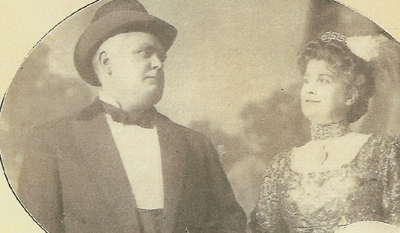
Tom Lewis & Helen Cohan in "The Little Millionaire"
"The success of such an entertainment as "The Little Millionaire" - and of course
its success is no doubt - is due to the fact that Mr. Cohan knows his little book
from the first page to the last and, as he might say, then some, maybe."
The New York Times
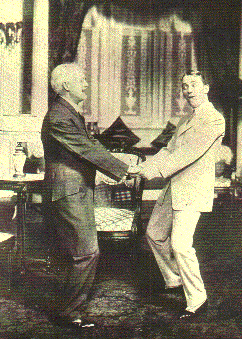
Jerry & George Cohan in
a scene from Act II of
"The Little Millionaire"
"One must concede that George M. Cohan has talent. He has nimble legs, and
he writes neat jingles of the popular kind. He also knows how to sing his ditties
in a way that sends his numerous followers into ecstasies of admiration. This
granted, Mr. Cohan has received about all the credit coming to him. No - we
forgot - he is also a specialist in the art of rolling up his eyes and talking through
his nose, talents which have earned for him the title "Yankee-doodle Comedian"
(whatever that may mean), a distinction shrewdly helped along by the adoption
of the United States flag as the trade mark of this particular actor.
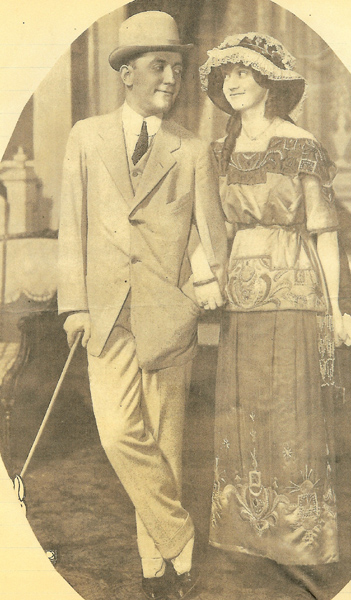
George M. Cohan & Lila Rhodes in
"The Little Millionaire"
All these peculiarities and characteristics have endeared George M. Cohan to
his special public. For there is a Cohan public just as there is a John Drew
public and a Maude Adams public, only it is not quite so select. The Cohanites
are not exacting in their demands. They'll applaud anything, accept anything, so
long as it bears the Cohan stamp. Plenty of noise, wild waving of the stars and
stripes, a slim comedian full of impudent self-assurance, his eyes half closed,
hopping about the stage, and they'll yell themselves hoarse. Otherwise, how
explain the vogue of "The Little Millionaire," which some enthusiastic scribes
have declared the best thing George has ever done? It is not. If Cohan's
reputation rested on this piece, he would never have come to own his own
theater on Broadway. It is the usual Cohan musical salad, only with a little
less dressing than usual. To recount the plot were to waste the reader's time.
It is hackneyed nonsense, with scenes thrown together in the crudest manner.
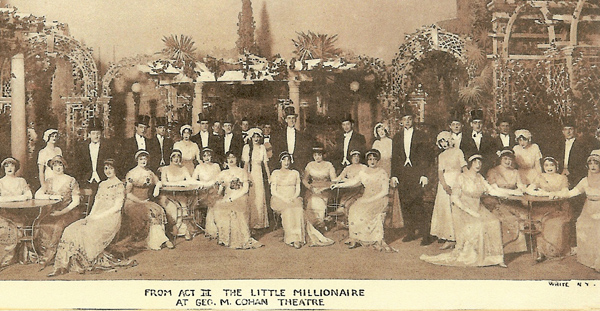
The chorus is unattractive, and has little to do. Interest is lacking from the start,
and the auditor yawns long before the end is reached. When the star himself
holds the center of the stage the piece moves along. A human dynamo of
nervous energy, Cohan keeps things hustling in his own characteristic style,
but what of it? What does all the fooling, the stereotyped scenes and
commonplace dialogue amount to if the play has, so to speak, not a leg to
stand upon? The best part in the piece, that of the fat man who stumbles
into everybody's way, is capitally acted by Tom Lewis, who has practically all
the second act to himself. Lila Rhodes, a graceful and pleasing young lady,
is Mr. Cohan's dancing partner."
Theater Magazine - November 1911
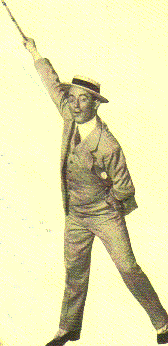
Another still from
"Anyplace The Old Flag Flies"
Cohan's Recollection:
"A fella come up and ask me during the rehearsals of the first act and say, 'What
am I going to wear in the second act,' I had a set speech for him. I'd say, 'Well I
don't know, but if you'd tell me what you'd like to wear, maybe you can give me an
idea for a second act.' Then I tried to explain to him that I was the kind of a fella
that never even started to write a second act until the first act had been in
rehearsal for at least a week."
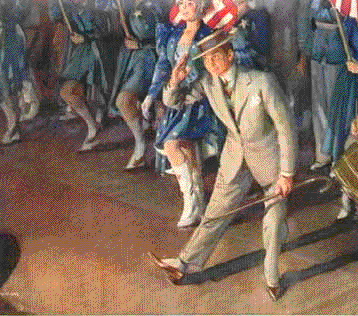
""Don't ever waste your time on a musical play again as long as you live,' advised
most of the boys after the "Wallingford" production. On the strength of this advice,
I sat down and wrote the book and music of "The Little Millionaire," which I personally
opened the following September, 1911. I "coppered" every bet they made on me
and always tried to do the unexpected."
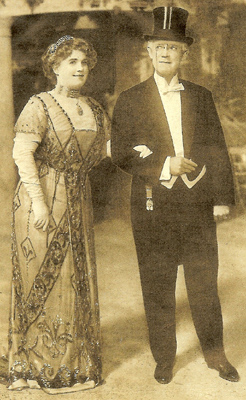
Helen & Jerry Cohan in
"The Little Millionaire"
Notes:
This was the last musical play that Jerry & Helen Cohan performed in.
Lila Rhodes, a distant cousin to Cohan, appeared as his leading lady. The
following year, Charles King took over the role of Robert Spooner (Cohan left to
appear in "45 Minutes From Broadway"), and later he would marry Lila Rhodes.
Eleven years after "The Little Millionaire," Charles King starred in one of Cohan 's
most successful musicals "Little Nellie Kelly" (1922). Rhodes would appear in
three more of Cohan's productions, "The House Of Glass" (1915), and the
Cohan Revues of 1916, & 1917.
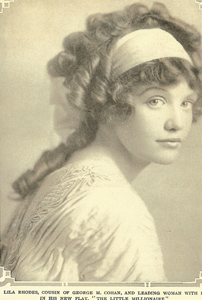
Lila Rhodes in a Publicity Portrait
With the creation of "The Little Millionaire," Cohan tried a new concept: He
decided not to feature any musical numbers during the second act. It was
an idea that would separate his musical comedy from others. It was far
from being Cohan's shortest on musical numbers, but the first seven songs listed
above were in the first act.

The song that critic Rennold Wolf referred to as the
best ballad sung by the villains was "Oh, You Wonderful Girl" which was
presented in both "Yankee Doodle Dandy" and "George M!" It is also interesting
to note that the photo used on the cover of the sheet music, was taken from
a scene in "The Yankee Prince."
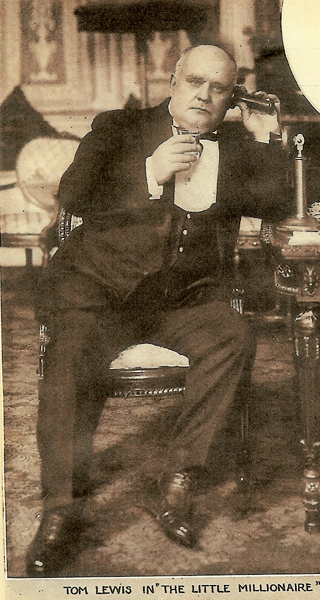
Tom Lewis who had appeared in the original productions of "Little Johnny Jones,"
and "The Yankee Prince" was given the best role in the show. This would be his
last with Cohan. He worked continually on Broadway ending his career in the
"Ziegfeld Follies Of 1924."
